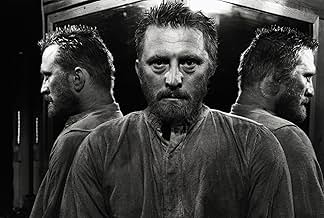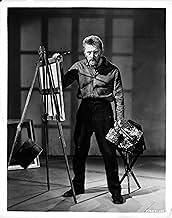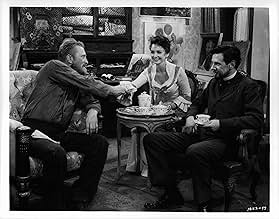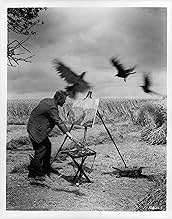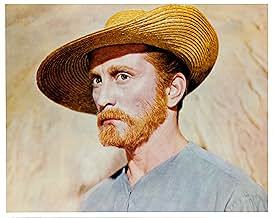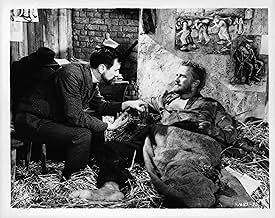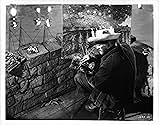VALUTAZIONE IMDb
7,3/10
12.926
LA TUA VALUTAZIONE
La vita straordinaria di un artista brillante ma tormentato: Vincent van Gogh.La vita straordinaria di un artista brillante ma tormentato: Vincent van Gogh.La vita straordinaria di un artista brillante ma tormentato: Vincent van Gogh.
- Regia
- Sceneggiatura
- Star
- Vincitore di 1 Oscar
- 4 vittorie e 6 candidature totali
Recensioni in evidenza
Lust For Life may look, at first glance, to be a typical Hollywood biopic, which is usually not much more than a star vehicle about a famous, real-life but vacuously recreated character, denuded of any real personality. Minelli certainly makes his biopic of Vincent Van Gogh with his trademark lavishness. But, importantly, he does not glamorise his subject. Instead, he makes a visually rich but earthy film, which exalts Van Gogh's achievement and seeks to portray the realities of his creative life and the dark side of his personality.
Lust For Life focuses on the extremely troubled man Van Gogh was, at turns listless, priggish, childish, needy, manic and quick-tempered; but also sensitive, caring, thoughtful, romantic and altruistic. Kirk Douglas is superb as Van Gogh, holistically exhibiting his various and contradictory aspects: obsessive though circumspect artist, diffident but passionate friend, forlorn romantic and dangerous maniac. It is all the more of an accomplishment as he is such a muscular, good-looking leading actor (nor should Anthony Quinn's key supporting performance as Gauguin, a macho with hidden sensibilities, be neglected).
However, at the same time, what the film never forgets is Van Gogh's considerable achievement. Minelli's iridescence complements Van Gogh's colourful, vivacious visual style, and many of his paintings are shown throughout the film.
Critics have pointed to the over-use of melodrama in the film. Yet Lust For Life is rare in that the film is consummated by its melodrama, along with Miklós Rózsa's grand, sweeping music. In other words, its melodrama succeeds, making the viewer identify more with Douglas' Van Gogh, giving him a greater, but also justified, pathos and sense of tragedy.
Lust For Life is the best Hollywood Biopic
Lust For Life focuses on the extremely troubled man Van Gogh was, at turns listless, priggish, childish, needy, manic and quick-tempered; but also sensitive, caring, thoughtful, romantic and altruistic. Kirk Douglas is superb as Van Gogh, holistically exhibiting his various and contradictory aspects: obsessive though circumspect artist, diffident but passionate friend, forlorn romantic and dangerous maniac. It is all the more of an accomplishment as he is such a muscular, good-looking leading actor (nor should Anthony Quinn's key supporting performance as Gauguin, a macho with hidden sensibilities, be neglected).
However, at the same time, what the film never forgets is Van Gogh's considerable achievement. Minelli's iridescence complements Van Gogh's colourful, vivacious visual style, and many of his paintings are shown throughout the film.
Critics have pointed to the over-use of melodrama in the film. Yet Lust For Life is rare in that the film is consummated by its melodrama, along with Miklós Rózsa's grand, sweeping music. In other words, its melodrama succeeds, making the viewer identify more with Douglas' Van Gogh, giving him a greater, but also justified, pathos and sense of tragedy.
Lust For Life is the best Hollywood Biopic
This is one of my favorite films. It deeply touched me. It's in my top 20 for sure. Maybe top 10. The acting, directing, and production are all about as good as it gets. It's a shame Kirk Douglas didn't win the best actor Oscar. I think it's his finest performance. I can't think of a single bad thing to say about this great movie. It's a vivid (and accurate) tribute to the immortal Vincent.
Kirk Douglas is Vincent Van Gogh in "Lust for Life," directed by Vincent Minnelli and also starring Anthony Quinn as Gaugin (Oscar winner for his performance), and James Donal as Van Gogh's brother Theo.
This film is actually based on the Irving Stone novel and while it leaves out parts of Van Gogh's life, it does seem to hit the high points. A sensitive man with a spiritual sense of life, Van Gogh seeks from the beginning to express God in some way and to give something to the world.
He is unsuccessful as a minister and eventually takes up painting, supported by his loving brother Theo. Basically he lives somewhere until whomever he's living with gets sick of him and throws him out.
Van Gogh is a terribly lonely man, but he has an intensity that is almost frightening to people. At one point, he takes up with a sometime prostitute with a baby - she eventually leaves.
In actual fact, when Van Gogh met this woman, named Sien, she was pregnant with a second child, who grew up believing Van Gogh was his father. Sien some 20+ years later commits suicide.
Van Gogh establishes a friendship with Gaugin and has dreams of an artist colony, but his relationship with Gaugin, as with everyone but his brother, ends terribly when he stalks Gaugin with an open straight razor, later cutting off part of his own ear.
It is evident from the film that whatever Van Gogh's mental problem was (and there are many theories, from bipolar, to epilepsy, to schizophrenia), it worsened as time went on, as did his physical condition. He would often buy paints rather than eat and would work ceaselessly.
Van Gogh only sold one painting in his lifetime - however, what the film does not show is that, had he chosen to live, he was on the brink of being recognized for his work.
His paintings had started being exhibited and appreciated and began to sell shortly after his death. What also isn't in the film is that his brother died shortly after Van Gogh did. It was Theo's widow who carried on the work that would be involved with Van Gogh's vast collection.
The film reduced me to tears - indeed, the song that says "they should have told you, Vincent, the world was never meant for one as beautiful as you" was certainly true. The only person who ever "got" Vincent was his brother.
As for the performances, Kirk Douglas makes a brilliant Van Gogh. Michael Douglas once said his father isn't considered a great actor because the style back then in the types of roles he played has changed.
It's true - seen today, Douglas' work seems too intense at times, too big, too over the top in these times of acting so naturally as to almost be boring. However, I believe that Van Gogh must have been like the Douglas characterization. He obviously drove people away in large masses, and Douglas captured that passion, drive, and overeagerness perfectly.
As Theo, James Donal is perfect as the calm one in the family. Anthony Quinn has a short but memorable role as the flamboyant Gaugin. He's wonderful - arrogant, opinionated, temperamental, with a bad temper, and Quinn plays him as an artist without the soul of Van Gogh. But who, after all, had the soul of Van Gogh?
Vincent Minnelli lovingly directed this film and it definitely has his wonderful attention to detail, flow, and artistic touch. And the paintings are breathtaking. A beautiful film that will stay with you for a long time, and you'll never see "Starry Night" in the same way again.
This film is actually based on the Irving Stone novel and while it leaves out parts of Van Gogh's life, it does seem to hit the high points. A sensitive man with a spiritual sense of life, Van Gogh seeks from the beginning to express God in some way and to give something to the world.
He is unsuccessful as a minister and eventually takes up painting, supported by his loving brother Theo. Basically he lives somewhere until whomever he's living with gets sick of him and throws him out.
Van Gogh is a terribly lonely man, but he has an intensity that is almost frightening to people. At one point, he takes up with a sometime prostitute with a baby - she eventually leaves.
In actual fact, when Van Gogh met this woman, named Sien, she was pregnant with a second child, who grew up believing Van Gogh was his father. Sien some 20+ years later commits suicide.
Van Gogh establishes a friendship with Gaugin and has dreams of an artist colony, but his relationship with Gaugin, as with everyone but his brother, ends terribly when he stalks Gaugin with an open straight razor, later cutting off part of his own ear.
It is evident from the film that whatever Van Gogh's mental problem was (and there are many theories, from bipolar, to epilepsy, to schizophrenia), it worsened as time went on, as did his physical condition. He would often buy paints rather than eat and would work ceaselessly.
Van Gogh only sold one painting in his lifetime - however, what the film does not show is that, had he chosen to live, he was on the brink of being recognized for his work.
His paintings had started being exhibited and appreciated and began to sell shortly after his death. What also isn't in the film is that his brother died shortly after Van Gogh did. It was Theo's widow who carried on the work that would be involved with Van Gogh's vast collection.
The film reduced me to tears - indeed, the song that says "they should have told you, Vincent, the world was never meant for one as beautiful as you" was certainly true. The only person who ever "got" Vincent was his brother.
As for the performances, Kirk Douglas makes a brilliant Van Gogh. Michael Douglas once said his father isn't considered a great actor because the style back then in the types of roles he played has changed.
It's true - seen today, Douglas' work seems too intense at times, too big, too over the top in these times of acting so naturally as to almost be boring. However, I believe that Van Gogh must have been like the Douglas characterization. He obviously drove people away in large masses, and Douglas captured that passion, drive, and overeagerness perfectly.
As Theo, James Donal is perfect as the calm one in the family. Anthony Quinn has a short but memorable role as the flamboyant Gaugin. He's wonderful - arrogant, opinionated, temperamental, with a bad temper, and Quinn plays him as an artist without the soul of Van Gogh. But who, after all, had the soul of Van Gogh?
Vincent Minnelli lovingly directed this film and it definitely has his wonderful attention to detail, flow, and artistic touch. And the paintings are breathtaking. A beautiful film that will stay with you for a long time, and you'll never see "Starry Night" in the same way again.
Although I started my academic career as an art major, my interest was always in making art of my own rather than studying the works of the past masters. As a result, I wouldn't know a Manet from a Monet, but one painter whose work I can always identify is Vincent Van Gogh, perhaps the most famous example of the "tortured artist" who sought solace from the pain of life through his work. Like so many artists from different mediums, Van Gogh's life, especially the dramatic episode in which he sliced off his ear in an epileptic fit, is more famous than his work, a situation heightened, no doubt, by Don Mclean's melancholy ballad "Vincent," an improbable chart topper in 1972. Prior to being honored by the composer of "American Pie," Van Gogh's biggest brush with popular success came with Vincent Minnelli's film of Irving Stone's best-seller, an often melodramatic but still effective dramatization of the artist's troubled life. Kirk Douglas' intense portrayal of the impoverished and often fanatical Dutchman is helped immeasurably by his physical resemblance to his subject. Bearded, and with his blonde hair dyed red, Douglas could easily be mistaken for the man whose self-portraits hang on the wall of the modest bedroom where much of the film takes place. Occasionally, Douglas' clenched teeth and fist approach to drama comes through to reveal the actor behind the makeup, but his Oscar nominated performance seldom falls victim to the actor's "star" persona. Even Anthony Quinn, an actor who has given the same performance in dozens of movies, is good, but his brief turn as Paul Gaughan is hardly distinguished enough to merit the Oscar for best supporting actor. The rest of the cast is beautifully assembled with James Donald properly sympathetic as Vincent's patient, supportive brother, Theo, and no way can I complain about any film that finds room for the splendid presence of Henry Daniell, seen here as the patriarch of the Van Gogh family. The paintings, a wild riot of colorful intensity, are seen throughout (courtesy of numerous private collectors and public museums, including my hometown's Cleveland Museum of Art), and without them, "Lust for Life" would have a lot less luster.
When I hear the name Vincente Minnelli certain scenes pop up on my inner screeningroom: A tracking shot at the fair (Some came running), the low tracking zoom towards Douglas and Turner at the pool (Bad and the Beautiful), snowmen (Meet me in St Louis) and the agony in Douglas's face in "Lust for life"; in fact as soon as his redbearded agonized face pops up, all the other movies fade away and "Lust for life" takes over my inner screening room.
But apart from being my favorite Minnelli movie, its a movie that more than any other shows his genius in use of colors; every scene is composed in breathtaking technicolor with the deepest respect for Van Gogh's own use of color, and Douglas's acting is filled with the same agony and passion as the strokes of Van Gogh's brush. As the other great movies who uses color to its fullest (Wizard of Oz, Black Narcissus, Ten Commandments), the simularities between the director and the painter is obvious. Hence, Minnelli's struggle for "painting" the scenes with the richness of technicolor becomes an echo of Van Gogh. It also reads as a textbook in composition from Steinberg's Dead Space to Eisenstein's juxtapositions. In all, Minnelli is of great skill and uses it to the fullest.
The story, which focuses on the struggle for a new way of expression, is tame at times and the acting (apart from Douglas) seems static most of the times, but the tortured face and body of Douglas and the use of color makes this one of the greatest achievements in MGM's history and one of the best movies Minnelli ever made.
But apart from being my favorite Minnelli movie, its a movie that more than any other shows his genius in use of colors; every scene is composed in breathtaking technicolor with the deepest respect for Van Gogh's own use of color, and Douglas's acting is filled with the same agony and passion as the strokes of Van Gogh's brush. As the other great movies who uses color to its fullest (Wizard of Oz, Black Narcissus, Ten Commandments), the simularities between the director and the painter is obvious. Hence, Minnelli's struggle for "painting" the scenes with the richness of technicolor becomes an echo of Van Gogh. It also reads as a textbook in composition from Steinberg's Dead Space to Eisenstein's juxtapositions. In all, Minnelli is of great skill and uses it to the fullest.
The story, which focuses on the struggle for a new way of expression, is tame at times and the acting (apart from Douglas) seems static most of the times, but the tortured face and body of Douglas and the use of color makes this one of the greatest achievements in MGM's history and one of the best movies Minnelli ever made.
Lo sapevi?
- QuizMany of the locations used for filming were the actual locations Vincent van Gogh visited in his life.
- BlooperAt Arles, when Paul Gauguin is explaining his philosophy, Vincent mistakes him for Theo saying "but Theo, err Paul..." However, this is in the script. The whole point of the line is that Van Gogh views his conversation with Gauguin as nothing more than an extension of talks he's had with Theo since childhood.
- Citazioni
Paul Gauguin: I'm talking about women, man. Women. I like 'em fat and vicious and not too smart. Nothing spiritual either. To have to say 'I love you' would break my teeth. I don't want to be loved.
Vincent Van Gogh: You really mean that, Paul.
- ConnessioniFeatured in Van Gogh: buio nella luce (1956)
- Colonne sonoreLa Marseillaise
(1792) (uncredited)
Written by Claude Joseph Rouget de Lisle
Played by a band in France, near the end
I più visti
Accedi per valutare e creare un elenco di titoli salvati per ottenere consigli personalizzati
Dettagli
Botteghino
- Budget
- 3.227.000 USD (previsto)
- Tempo di esecuzione
- 2h 2min(122 min)
- Proporzioni
- 2.55 : 1
Contribuisci a questa pagina
Suggerisci una modifica o aggiungi i contenuti mancanti

![Guarda Trailer [OV]](https://m.media-amazon.com/images/M/MV5BNjMwYjdhMDItMDA1NC00YjJlLWFhZjctYWY5YjBlNDdiODFiXkEyXkFqcGdeQXRyYW5zY29kZS13b3JrZmxvdw@@._V1_QL75_UX500_CR0)
